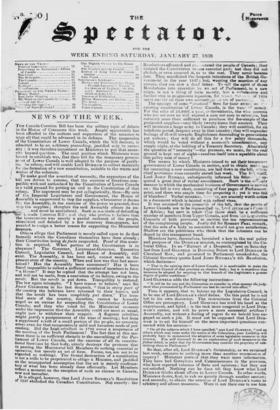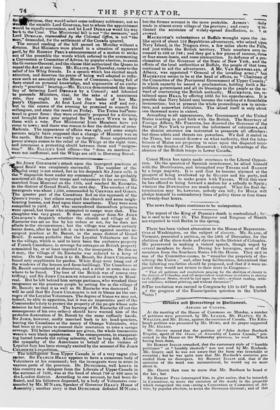NE WS OF THE WEEK.
THE Canada Coercion Bill has been the solitary topic of debate in the House of Commons this week. Ample opportunity has been afforded to the authors and supporters of the measure to urge all that could be advanced in its defence. The suspension of the Constitution of Lower Canada, which the bill decrees, is admitted to be an arbitrary proceeding, justified only by neces- sity : it was therefore incumbent on Ministers to put that neces- sity beyond question. The next position which Ministers were bound to establish was, that their bill for the temporary govern- rn:nit of Lower Canada is well adapted to the purpose of pacify- ins' • lie colony, and will enable Lord DURHAM to collect materials for the formation of a new constitution, suitable to the wants and wishes of the colonists.
To make good the assertion of necessity, the supporters of the bill are driven to assume, that the exercise of functions com- patible with and authorized by the Constitution of Lower Canada is a valid ground for putting an end to the Constitution of that colony. The argument may be put syllogistically, thus—By acts of the. Imperial Legislature and Government, the House of Assembly is empowered to stop the supplies. whensoever it deems fit ; the Assembly, in the exercise of the power so granted, does stop the supplies ; therefore the said Assembly abuses its au-
, and must be annroilated. Such is oee tootle of defending
made Coercion B:il : aid they who profess v: believe that the insurrection was merely a partial outbreak of the people, stimulated and deluded by a few runaway demagogues, are puzzled to assign a better reason for supporting tha Ministerial measure.
Others allege that Parliament is merely called upon to do that formally which the Canadians themselves have done already ; their Constitution being de facto suspended. Proof of this asser- tion is required. What portion of the Constitution is in abeyance? The Governor, Lieutenant-Governor, Executive Council, Legislative Council, and House of Assembly, still exist. The Assembly, it has been said, cannot meet in the present state of the country. When and bow was that fact ascer- tained ? Has the Assembly been summoned ? Has it been found impossible to collect a sufficient number of members to form "a House?" It may be replied that the attempt has not been, and will not be made, from a conviction of its failure, owingto the revolt. But the revolt is put down. Tranquillity is restored. The law again triumphs. " I have reason to believe," says Sir JOHN COLBORNE in his last despatch, " that in every part of the country the habitans have returned to their houses, and that the revolt has been completely put down." The trou- bled state of the country, therefore, cannot be honestly urged as an excuse for suspending the Constitution of Lower Canada; and they who voted for the Ministerial measure under the impression that the Assembly could not meet as usual, ought now to withdraw their support. A flagrant rebellion might justify a postponement of the time of meeting; but from a suppressed revolt of a small portion of the people, no necessity arises even for that comparatively mild and harmless mode of pro- eeeding. Did the Irish rebellion in 1798 cause a suspension of the meeting of the Irish Parliament? The fact that at this mo- ment there is no sufficient obstacle to the assembling of the Par- liament of Lower Canada, and the exercise of all its constitu- tional functions by that body, utterly destroys the pretence that in passing the Ministerial bill Members do nothing essential or operative, but merely an act of form. Forms, too, are not to be regarded as nothings. The formal destruction of a constitution is not a trifle to be perpetrated to oblige a Minister, and justified on the unsupported assumption that the act is merely confirma- tory of what has been already done effectually. Let Members reflect a moment on the reception of such an excuse in Canada, now and hereafter. It is alleged, however, that Lord Joins RUSSELL'S Resolutions of 1837 abolished the Canadian Constitution. No exactly : the Resolutions affronted and ex., -aerated the people of Canada ; they violated the Constitution in one essential part; but they did not abolish, or even suspend it, as to the rest. They never became law. They manifested the despotic intentions of the British Go- vernment in the year 1837 ; • but, wanting the sanction of any statute, they are now a dead letter. To Pall the spirit Of those Resolutions into operation b■ an act of Parliament, in a new reign, is not a thing of form merely, hitt a soistavitive and further step in progressive injustice, for ‘t hit n fh" . of I S31 must ans-ver Ott their own account ps -3 bat Of pott.,!11 . The apo!ogy of some "practical' Men for their atlas- or. existing constitution 'of Lowe: Canada, is the wati: • money. For the sake of 50,000/. a year, or thereabouts, the vri,e. persons who are set over us will expend a sum not easy to calcu'a:e. but certainly more titan sufficient to purchase the fee-simple of the postponed supplies—very likely twenty times that amount. They will maintain a large army in Canada; they will establish, for an indefinite period, despotic sway in that country ; they will engender feelings of towards Englishmen descending to generations yet unborn ; they will do all this for a few paltry thousands, which would be voted without a moment's consideration, any supply night, at the bidding of a Treasury Secretary. Absolutely the question of " necessity "—the pretence, we mean, for the real ground is kept out of sight—resolves itself into a squabble about this paltry sum of money ! The means by which Ministers intend to set their temporary government of Lower Canada in motion, and to obtain mat,. 7,,,„ • for concocting a new constitution, are laid down in the bill, whose chief provisions were correctly stated last week. The hi', itself, Lord JoHN Russet'. subsequently informed his folios re- quired a great deal of verbal amendment. Such 4s the manner in which the mechanical !ruthless of Government is carr'ei on : the bill is very short, consisting of four pages of Parliament- print, and there was ample time for preparing it ; yet it was full of blunders ! Verbal mistake, I, "or, are scarcely worth notice in a document which is tainted with radical vices.
It was assumed in the preatn4e of the bill, ilea the peteile of Lower Canada are to be represeited mu, Lerd Demur's CiAtn".il of Advice; but care is taker tCat there shall he a suffieient number of members from Upper Canada, and from .,0 Councils of both provinces to outvote the ten representatives of the complaining people. Justly did Sir ROBERT PEEL remark, that the acts of a body so constituted would not give satisfaction. Shallow are the politicians who think that the colonists can be duped by this transparent fraud. Ministers have, themselves, furnished a key to the real policy and purpose of the DURHAM mission, as contemplated by the Co- lonial Office. In an "Extract of a Despatch," sent on Saturday last from Lord GLENELO in Downing Street to Lord DURHAM In Cleveland Row, and presented to Parliament unasked-for, the Colonial Secretary quotes Lord JOHN RussaLes 4th Resolution, which declares-
" That in the existing state of Lower Canada, it is ;inadvisable to make the Legislative Council of that province an elective body ; but it is expedient that measures be adopted for securing-to that branch of the Legislature a greater degree of public confidence."
Lord GbErtutto adds the following instruction-
" It will be for you and the Committee to consider in what manner thejay. ment thus pronounced by Parliament can best be carried into effect."
Thus it appears, that to bolster up the Legislative Council, is to be one of Lord DURHAM'S chief duties. On this point he is not left to his own discretion. The instructions from the Colonial Office are peremptory. Lord GOSFORD has tried his band at the experiment, and failed : is the task more congenial to Lord Dos- H AM'S nature, and will he prove a more successful artificer? Assuredly, not without a feeling of regret do we behold him en- gaged on such a job. It must not be supposed that Lord DM- HAM is to act for himself on the more important questions con- nected with his mission- " On all the subjects which I have specified," says Lord GLaNaLC, "and on others which may come under the notice of the Committee, your Lordship wilt probably have to recommend the adoption of some legislative measures in this country. You will transmit to me an explanation of such measures is the fullest detail, in order that the Government may consider the propriety of sub- mining them to Parliament."
So that, after all, Lord DURHAM'S dictatorship, as we surmised last week, amounts to nothing more than another commission of inquiry ! Ministers pretend that they want more information. They have had Governors and Commissioners in the province, who have reported volumes of facts and opinions; but they are not satisfied. Nothing can be done till they know what Lord DURHAM thinks about affairs in Lower Canada. In other. words, Ministers desire, first, to rub on quietly through another session; and secondly, to obtain the sanction of Lord DURHAM'S name to arbitrary and odious measures. Were it not their cue to use him
fey nrpose, they would select some ordinary nobleman, not so wet the amiable Lord GOSFORD, but to whom the appointment
would be equally convenient, and let Lord DURHAM wend his way back to the Czar. The Ministerial bill is not " the measure," and Lord DURHAM, trammelled by Me Colonial Qffloe, is not "the man," demanded, for the settlement of the Canada quarrel. The second reading of the bill passed on Monday without a ihision. But Ministers were placed in a situation of apparent peril, by Sir ROBERT PEEL'S announcement of a motion to strike out of the preamble the words which referred to the summoning a Convention or Committee of Advice, by popular election, to assist the Governor-General, and the clause that authorized the Queen to repeal the Ant at any time. Mr. Emden, on Thursday, came to the relief of his Whig friends. In a speech which has excited much attention, and deserves the praise of being well adapted to influ- ence such an assembly as the House of' Commons,—being full of facts stated on personal knowledge, and arguments of an exclu-
1 sively "practical " bearing,—Mr. Ewes demonstrated the impo-
: !icy of fettering Lord DURHAM by a Council ; and laboured to persuade Ministers, that, for the sake of a unanimous rote, they ought to yield to the leader of her Ma-
, jesty's Opposition. At first Lord JOHN was stiff and coy ; i but in the course of the evening he promised to consult his colleagues, and state the result on Friday. The Tories had'mus- tered in great force : they were evidently prepared for a division,
l and brought down poor crippled Sir WATK1N WyNIV to help i them with a vote. Few Ministerial Irish Members have yet )come to town; and there was reason to fear the defection of some Radicals. The appearance of affairs was ugly, and some simple ' persons might have ,supposed that a change of Ministry was on the cards. But there was really no danger. Some supernatural \i.
power always comes to the relief of the Whigs at the right time, and interposes a protecting shield between them and " resigna- tion." Mr. ELtaces kind offices—the " deus ex machine "— were not ineffectual, and the Whigs are still in Downing Street.



























